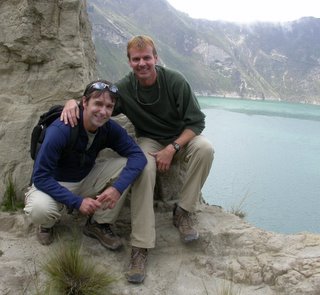Sopranos "Cold Stones" episode
Wow, what a great episode.
Given the huge coverage of homosexuals on TV over the last 5-6 years, I wasn't crazy about the story line of Vito, the gay mobster. But they really brought it together, making Vito's violent murder by the rival NY family the catalyst for the mob war to end all mob wars.
After Phil's wife says that Vito has to be made to face his problems squarely -- code to Phil that he must to kill Vito -- we see Carmela in Paris next to a statue of Christ with the sign "Ecce homo." Ecce Homo translates to "How One Becomes What one Is."
It seems as though the episode was about the reltionship of domination and sex:
-- As Vito was beaten to death -- with a pool stick shoved up his rear, we find out later -- Phil sits on the bed right in front of Vito, Phil looking down on Vito, his legs spread and his right hand on his crutch, so excited by the domination that his left hand sqeezes the matress as Vito is beaten with a bat. Previously, Vito had spent 20 years in jail, so presumably this little scene brought back violent sexual memories.
-- The scene immediately preceding the Vito-Phil snuff scene was that of Tony driving the Escalante while getting a BJ from one of the Bada Bing strippers. Same climactic expressions on both Tony and Phil, the NJ and NY bosses, respectively.
-- In the scene that sets off the mob war, Dom from the NY family is "busting balls" by bragging that Vito was raped with a pool stick. Despite several signals that he needs to back off (not push the NY domination), Dom says he heard that "Carlo's lipstick was on Vito's cock." Carlo's immediatle reaction is to stick Dom five times (fast) with a 9" knife. As Carlo stands over Dom, his 9 inches protruding from his hip, Dom's bloddy white shirt streched over his huge belly is reminiscent of the bloddy bed sheet that an Italian family would hang out the morning after a honeymoon to show that the bride was a virgin (using sheep's blood, if necessary).
-- "Cold Stones," the title of the episode, is not only a reference to the Parisian statues that inspire Carmella (and remind her of poor Adriana) but it is also a reference to Victor Hugo's "Notre-Dame de Paris" or "The Hunchback of Notre Dame."
Given the huge coverage of homosexuals on TV over the last 5-6 years, I wasn't crazy about the story line of Vito, the gay mobster. But they really brought it together, making Vito's violent murder by the rival NY family the catalyst for the mob war to end all mob wars.
After Phil's wife says that Vito has to be made to face his problems squarely -- code to Phil that he must to kill Vito -- we see Carmela in Paris next to a statue of Christ with the sign "Ecce homo." Ecce Homo translates to "How One Becomes What one Is."
It seems as though the episode was about the reltionship of domination and sex:
-- As Vito was beaten to death -- with a pool stick shoved up his rear, we find out later -- Phil sits on the bed right in front of Vito, Phil looking down on Vito, his legs spread and his right hand on his crutch, so excited by the domination that his left hand sqeezes the matress as Vito is beaten with a bat. Previously, Vito had spent 20 years in jail, so presumably this little scene brought back violent sexual memories.
-- The scene immediately preceding the Vito-Phil snuff scene was that of Tony driving the Escalante while getting a BJ from one of the Bada Bing strippers. Same climactic expressions on both Tony and Phil, the NJ and NY bosses, respectively.
-- In the scene that sets off the mob war, Dom from the NY family is "busting balls" by bragging that Vito was raped with a pool stick. Despite several signals that he needs to back off (not push the NY domination), Dom says he heard that "Carlo's lipstick was on Vito's cock." Carlo's immediatle reaction is to stick Dom five times (fast) with a 9" knife. As Carlo stands over Dom, his 9 inches protruding from his hip, Dom's bloddy white shirt streched over his huge belly is reminiscent of the bloddy bed sheet that an Italian family would hang out the morning after a honeymoon to show that the bride was a virgin (using sheep's blood, if necessary).
-- "Cold Stones," the title of the episode, is not only a reference to the Parisian statues that inspire Carmella (and remind her of poor Adriana) but it is also a reference to Victor Hugo's "Notre-Dame de Paris" or "The Hunchback of Notre Dame."
That force of sex and blood which, in the madness of youth, I had imagined that I had stifled forever had, more than once, convulsively raised the chain of iron vows which bind me, a miserable wretch, to the cold stones of the altar.


<< Home